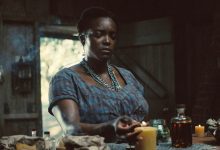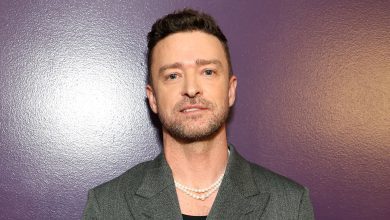Dane DeHaan Wants Hollywood to Take Risks With Films Like ‘Wardriver’
Dane DeHaan is very relieved to finally be talking about Wardriver — the script first landed in his inbox a decade ago.
Directed by Rebecca Thomas (Stranger Things) and written by Daniel Casey (F9: The Fast Saga, 10 Cloverfield Lane), Wardriver spotlights the art and culture of wardriving: a microcosm of the hacking industry that involves searching for networks from a moving vehicle. His modern day Robin Hood-esque character, Cole, exploits this highly specialized skill of his to commit high-tech robberies from his laptop.
When criminal Oscar (played Mamoudou Athie) uncovers Cole’s abilities, he forces him to hack the account of the Sarah (Sasha Calle, best known for The Flash), draining nearly a million dollars. Cole discovers that a powerful, mob-connected lawyer (Jeffrey Donovan) has been using Sarah to hide his money. Falling in love with Sarah, DeHaan’s character initiates a plan to replace the stolen money and protect Sarah, but soon finds himself in deep water.
DeHaan, star of The Amazing Spider-Man 2, The Staircase, and most recently, Christopher Nolan‘s Oppenheimer, is a producer on the film, alongside Tim and Trevor White’s Star Thrower Entertainment, David M. Wulf and Highland Film Group (who is representing international rights and continuing sales at the American Film Market, running from Nov. 5-10).
However, the actor reveals, Wardriver took a little while to get made. After bouncing around directors and producers for 10 years, Thomas finally took on the project as her second feature film and managed to shoot in just 20 days: “I haven’t made a film this quickly and this down and dirty in a while,” DeHaan says.
He spoke to The Hollywood Reporter about the it-factor of co-star Calle, the community spirit of Salt Lake City, Utah, and why this film, as well as Oppenheimer, is proof of vital risk-taking in Hollywood: “Everyone just seems scared to make the first move and it’s like, let’s start taking risks… Let’s fucking go! You know?”
Congratulations on this film! What attracted you to Wardriver?
I have a really long history with this movie. Actually, I first received the script for Wardriver 10 years ago, it’s been in my inbox for 10 years. It’s a really gripping story with a lot of interesting twists and turns, but it’s also a part of the world that I wasn’t aware of. I didn’t know what wardriving was or what this world was. It’s just a really great like part for me. Honestly, it’s a part I always felt like I could bring to life. He’s like a modern day Robin Hood. I think 10 years ago, when I first got the script, I was playing a lot of bad guys, and this seemed to be a great opportunity to play someone whose heart is really good and wonderful, and who wants to help people, but also gets himself in a very exciting situation.
Why do you think it is that you were playing so many bad guys?
I don’t know. I think that I’m not afraid to go to whatever place I have to as an actor. Whether it’s the happiest of times or the worst of times, I fully embrace the role and the circumstances and dive in and try to make it as realistic as possible. I think probably especially with Chronicle (2012) being one of the first movies I did where I was a bad guy, I think it showed that I could do it, and those were a lot of my strengths. That probably had something to do with it.
You’ve worked with some really impressive directors over the course of your career — recently, for example, Christopher Nolan in Oppenheimer. How was it working with Rebecca, was her approach different to others you’ve worked with?
Becca was awesome. I haven’t made a film this quickly and this down and dirty in a while. You know, we made this movie in like, 20 days. It was a very like run and gun scenario.
Dane DeHaan as Kenneth Nichols in ‘Oppenheimer’. © Melinda Sue Gordon/Universal Pictures.
Wow. When was the shoot?
I think it was June. And a lot of it takes place at night so we were also shooting at the time of year where you don’t get as much night time. I think Becca has a really keen understanding and sense of the edit and the shot she needs, and she really knows what she’s doing. She came in pretty last minute for us and kind of saved the day on this film. The writer, Dan, was gonna direct it, and he dropped out last second, and it seemed like the movie was going to fall apart, and Becca came in and saved us all. And I think she’s always been the person that should direct this movie.
She directed her first feature a long time ago, and then she went into the world of television. In a way, I know this is her second feature, but it kind of feels like her second first feature to me, because there’s that hunger, and there was throughout our whole cast and crew to try to make something cool and interesting and special, but do it fast. I think Becca’s intelligence and film know-it-all… I don’t know we would have made it through the shoot without that.
What is it that makes Wardriver special?
I do think it’s a really unique microcosm, the world of wardriving. microcosm of the world war driving. And I think it speaks to this modern day Robin Hood idea of Cole, my character, he steals from corporations, and he steals from banks. And all of the money he steals, even if it is from an individual, he makes sure that it’s reimbursed by banks so he’s not harming the little man. He’s really helping them. He’s the kind of person that gives back a lot of the money he makes, whether that’s through the prepaid gift cards that he gets, or some kind of crowdfunding app. I think that Wardriver takes that idea of Robin Hood but brings it in into modern day in a way that’s really cool.
Do you think Daniel was making any kind of social commentary? What is the film’s message?
Well, I think, first of all, the movie is a lot of fun and thrilling, and we’ve managed to pack [in] some action, some sexiness and violence and all the things that make it something you want to watch. But I think there is a real rooting for the underdog that goes along with watching the film as well. [But] this is not a political film. I mean, you’re taking a person that goes up against big corporations and fights for the little man, but that’s broad strokes. I think within that world, we’ve found something incredibly fun and dynamic and exciting. And I think that’s one of the reasons you root for my character the whole way through, because he is, in a lot of ways, fighting for the greater good and for people’s humanity. And he wants to use his skills, his hacking skills, his wardriving skills, his technical skills, to help people that really need help.
Sophie Turner was originally attached to this project, right?
I would say she was, at one point, attached to the film. But like I said, I’ve had it for 10 years, I’ve seen this go through so many different directors, so many different people playing that part, you know? And at one point Sophie was going to do it, yeah, it was when we were making The Staircase together. I gave her the script and she really liked it.
Why did the film take so long to come to fruition?
Oh, man, it’s just the story of so many independent movies, where it’s a miracle anytime they get made They have to have the right producer, the right cast, the right director, and it all needs to come together. Over the past year, we couldn’t [film] because of the strike, and then we had issues getting the waiver to shoot during the strike. And then we were about to shoot, and Dan was going to direct it, and he dropped out to take some writing job. There was still the passion with me and the producers to get this thing made. And that’s when they brought Becca in. And like I said, she saved us. I think at one point, a long time ago, it was set up at Universal, and then it changed hands from producers and you have to get the right cast together to get the funding. It’s the journey of any indie movie, but I think there’s something that feels like it’s a miracle anytime they’re made. But with this one in particular, especially because it had fallen apart two times this year, it really felt like a miracle, and it really felt like this was the right team to bring it to life.
Do you think that speaks to the difficulty that indie films are in at the moment, in the industry?
Absolutely. I mean, the industry is in a really weird place anyway, not just indie movies, but I think, yeah, I’ve seen many projects fall apart this year, so the fact that we were even able to get this one up and running and finish it and make something cool and exciting… I think it speaks to how special the project is, that there’s enough motivation to actually get it made at the end of the day. But yeah, the whole business right now seems to be in a pretty tricky spot that I would appreciate if it would figure out. [Laughs.]
Is it just a lot more uncertainty for actors?
Yeah, it’s crazy. I don’t even know what it is. I know it’s a combination of things, but I think at the end of the day, the people that are pressing the ‘go’ button, making that final decision, they just have to start taking risks. This isn’t really what the interview is supposed to be about! But the strike, it happened at an unfortunate time in our industry because it was when the Barbenheimer thing was happening. And usually the people that run the studios, when something like that happens, they just say, “Oh, those are the movies people want to go see. Let’s make more of those movies.” And I think if, in that time, they would had the ability to make more movies like Oppenheimer, would they be taking that risk now? Maybe.
I would love to see more movies like that get made, but it seems like they took such a break from everything. Everyone just seems scared to make the first move and it’s like, let’s start taking risks. Oppenheimer, that was a 185-page movie, but the studio was confident in the filmmakers and the cast and the producing team to make something come to life and make it magic. And I think that should be the lesson. We’re all capable people. We work at the highest level of our industry, like, let’s fucking go! You know?
Well put! And Wardriver seems to have a very capable cast. What was it like on set and were there any performances that surprised you?
We have a really awesome cast. Sasha Calle, she has that charisma, you know, that je ne sais quoi. Even on set, everyone wanted to hang out around her and be around her and joke around with her. I think she’s a star. I really do. I think she’s really got that thing. And I was so happy that she came on. It was so interesting to hear her story. I wasn’t very familiar with her, but as soon as I found out about her… Her first movie ever was The Flash, which is just like, what a wild first movie, you know? You have to be a star to have that be your first opportunity in film. And Mamoudou, I mean, he’s just such an actor. He’s an actor’s actor. He went to Yale. He’s like a martial artist. He brought this interesting, sly, physical intimidation factor to the part that I never thought he would. The diverse, eclectic, fun, exciting cast… the three of us are very different in life, and I think our energies come across differently on screen too, but they meld together into something, something really cool.
This must have been a very tech-y shoot. I wonder, is there anything practical that you learnt or anything you’ve added to your skillset?
I learned a lot. What I will say is our props department, honestly, they were unbelievable, like they understood everything in a way that I wish I could have. And the way that they made the wardriving and card skimming world come to life in this film, lit just elevates it to a whole other level. I know that tech savvy people, hackers, wardrivers, card skimmers, they’re gonna love this movie because the technology is there and it’s right. And every aspect of it, we just had the perfect prop people, because they understood and got this world, and they made stuff that — if it wasn’t real — seemed as real as could be.
Is there anything else you wanted to add or that stayed with you from this experience?
I just want to say we made the film in Salt Lake City, Utah, which was a place I had never worked before, and I had never really heard of many people workin in Utah. I didn’t know what to expect going into it, this indie movie with a Utah crew. And the community of people in Utah… It’s almost like a family, and they’re all so good at what they do, and we couldn’t have done it without them in that community that they’ve built over the years. So I just wanted to give a shout out to Utah and its crews for going along this ride with us and helping make something special. I think that’s, that’s the only other thing I’d like to say.
How lovely — do you want to do your next film in Utah?
Sure, I would, gladly. I would go in without trepidation now because I know how great they are.
Source: Hollywoodreporter
Related Posts
- Roundball Rocked: With NBA Return Looming, NBC Purges Scripted Roster
- SoundCloud Says It “Has Never Used Artist Content to Train AI Models” After Backlash on Terms of Service Change
- Fox News’ Camryn Kinsey Is “Doing Well” After Fainting on Live TV
- Kerry Washington and Jahleel Kamera in 'Shadow Force.'
Courtesy of Lionsgate
…
- This Alternative Artist Landed a Top-20 Chart Debut With an Album Made Almost Entirely on His Phone





